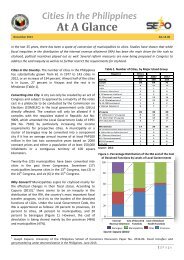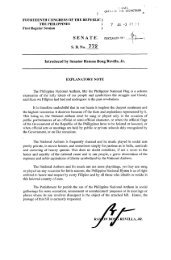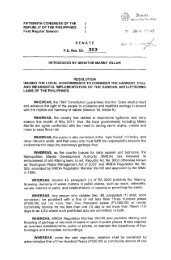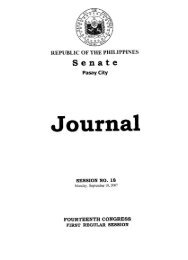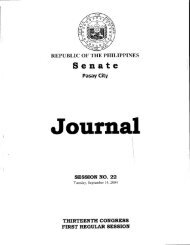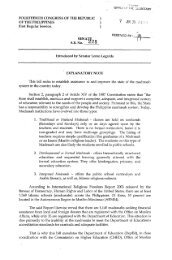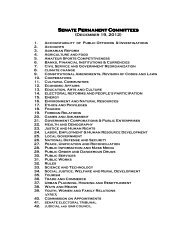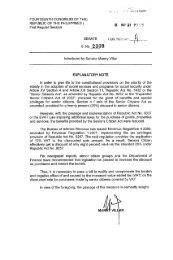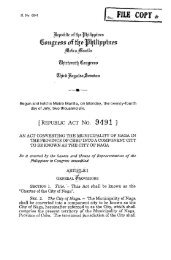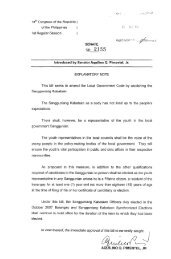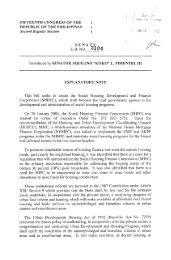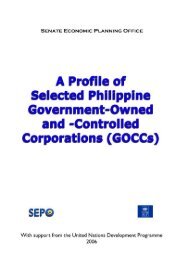SBN-1064 (as filed) - Senate
SBN-1064 (as filed) - Senate
SBN-1064 (as filed) - Senate
You also want an ePaper? Increase the reach of your titles
YUMPU automatically turns print PDFs into web optimized ePapers that Google loves.
FIFTEENTH CONGRESS OF THE<br />
REPUBLIC OF THE PHILIPPINES<br />
First Regular Session<br />
)<br />
)<br />
)<br />
SENATE .<br />
S.B. No.<strong>1064</strong><br />
EXPLANATORY NOTE<br />
Creative industries are considered one of the f<strong>as</strong>test growing sectors in the<br />
global economy today. In fact, they contribute significantly to the Gross Domestic<br />
Product (GOP) of many developed countries <strong>as</strong> they capitalized on their cultural and<br />
creative industries to enhance and grow their, economies. Macau, for example,<br />
established a Center for Creative Industries to <strong>as</strong>sist in all <strong>as</strong>pects of their development.<br />
Hong Kong adopted an action-oriented strategy for their promotion with the active<br />
participation of the business sector. Singapore developed a "Media Lab" <strong>as</strong> one of their<br />
showc<strong>as</strong>e projects for creative industries. Japan established the "Creative City", an<br />
urban revitalization project which became popular worldwide.<br />
Although the Philippines h<strong>as</strong> the potential to develop new are<strong>as</strong> of wealth and<br />
employment <strong>as</strong> it is rich in cultural heritage and inex,haustible pool of talents, the country<br />
still remain a marginal player in the global market.' While we produce world-renowned<br />
artists, singers, musicians, dancers, designers, a'Tlong others, still the contribution of<br />
creative industries to our economy h<strong>as</strong> remained ipsignificant. Likewise, due to lack of<br />
incentives, financial, educational, infr<strong>as</strong>tructure and technology support from the<br />
government and bUsiness sector, our local industries established through the creativity<br />
and innovativeness of Filipino entrepreneurs are not yet fully developed.<br />
Section 9, Article II of the Constitution which provides, among others, that "the<br />
State shall promote a just and dynamic social order and free the people from poverty<br />
through policies that provide and promote full employment, a riSing standard of living<br />
and an improved quality of life for all." This bill, in consonance with the above-quoted<br />
provision, seeks to promote creative industries in the country by establishing the<br />
Creative Industries Development Council that shall provide an environment conducive<br />
to the enhancement and stimulation of creativity and innovative endeavors among the<br />
citizenry. The Council, shall, among others: provide high quality trainings for skills and<br />
creativity development; formulate me<strong>as</strong>ures that shall stimulate creativity and<br />
innovations among the youths to ensure long term supply of creative talents; conduct a<br />
comprehensive mapping of individuals or groups involved in creative industries; design<br />
practical tools to <strong>as</strong>sist individual creators and creative communities to effectively use<br />
and diversify their products to be locally and globally competitive.<br />
The proposed me<strong>as</strong>ure likewise seeks to address the problem of selling the<br />
products of' creative industries by mandating the local government units to actively<br />
participate in the promotion of these industries in their respective actively participate in<br />
the promotion of these industries in their respective locality through the <strong>as</strong>sistance of<br />
the local branches of the Department of Trade and Industry (DTI) nationwide. In order to<br />
avail of the incentives provided for under this me<strong>as</strong>ure like tax exemptions, financing<br />
<strong>as</strong>sistance, among others, creative industries are required to register with their<br />
respective Municipal and City Tre<strong>as</strong>urer for the issuance of a Certificate of Authority.
Nurturing and exploitation of creative industries in our country through an<br />
effective national policy could really contribute to 'job creation, income generation and<br />
poverty alleviation.<br />
In view of the foregoing, immediate p<strong>as</strong>sage of this bill is recommended.<br />
,<br />
2
a) To develop greater awareness and understanding of the creative industry and its<br />
contribution to the Philippine economy and to formulate strategies on how the<br />
government, business and private sectors may work together to help develop<br />
and promote the same;<br />
b) To broaden knowledge and visibility of the products of creative industries by<br />
providing a showroom for them in a suitable and well- located environment;<br />
c) To create more employment through the development of creative industries in<br />
the countryside; To provide high quality ,trainings for skills and creativity<br />
development; and<br />
d) To enhance awareness of intellectual property rights, thus, strengthen the<br />
foundation for successful creative industries.<br />
SECTION 6. Powers and Functions of the Cou'ncil. - The Council shall<br />
have the following powers and functions:<br />
a) Formulate a national policy for the promotion and enhancement of creative<br />
industries in the country; .<br />
b) Identify creative industries in all localities· by conducting a comprehensive<br />
mapping to determine the kind of industry a'ld the individuals or groups involved<br />
therein and the strategies for their promotion. and development;<br />
c) Conduct seminars and thorough research study of identified creative industries to<br />
establish a stronger connection between culture, education and training;<br />
d) Undertake information dissemination on the economic, social and cultural impact<br />
of intellectual property rights on the creative industries to avoid duplication and<br />
conflict of interest among creative enterprises;<br />
e) Design and commission practical tools to <strong>as</strong>sist individual creators and creative<br />
communities to effectively use and diversify their products to be locally and<br />
globally competitive;<br />
f) Collaborate with public and private funding partners for creative industry-related<br />
activities, such <strong>as</strong> the Land Bank of the Philippines, the Small Business<br />
Guarantee Finance Corporation (SBGFC) and other lending institutions that shall<br />
implement technical cooperation projects in the field of creative industries; and<br />
g) Ensure long term supply of creative talents by formulating me<strong>as</strong>ures to stimulate<br />
creativity and innovation among the youth; and<br />
h) Conduct a regular Trade, Craft and Industrial Expositions once a year to<br />
showc<strong>as</strong>e the products of creative industries.<br />
SECTION 7. Composition of the Council. - The Council shall be composed of the<br />
following;<br />
a) Secretary of the Department of Trade and Industry (DTI), <strong>as</strong> Chairman;<br />
b) Secretary of the Department of Science· and Technology (DOST) <strong>as</strong> Vice-<br />
Chairman; Undersecretary of the Department of Labor and Employment<br />
c) Director-General of the Intellectual Property Office (IPO);<br />
d) Undersecretary of the Department of Labor (DOLE);<br />
e) Undersecretary of the Department of Education (DepEd);<br />
f) Chairman of the Commission on Higher Education (CHED);<br />
g) Director-General of the Technical Education and Skills Development Authority<br />
(TESDA);<br />
h) Commissioner of the National Heritage Commission (NHC);<br />
i) Director-General of the Technology and Livelihood Research Center (TLRC);<br />
j) A representative from the Center for International Trade, Expositions and<br />
Missions (CITEM»;<br />
k) A representative from the Design Center Philippines;<br />
I) A representative of the Film Academy of the Philippines; and<br />
m) A representative of the Indie Films Association of the Philippines.<br />
4
SECTION 8. Domicile of the Council. - The principal office of the Council shall<br />
be established in Metro Manila, Philippines. It shall' have branches or offices in every<br />
provincial and regional office of the DTI, <strong>as</strong> its operations and activities may require.<br />
SECTION 9. Mapping Creative Industries. - The Council, through the<br />
respective DTI regional and provincial offices, shall conduct comprehensive mapping in<br />
the various localities nationwide to determine the sustainable creative industries therein<br />
that may be promoted and <strong>as</strong>sisted by relevant government agencies.<br />
SECTION 10. Registration of Creative Industries. - All creative industries<br />
nationwide shall be required to register with their respective municipal or city Tre<strong>as</strong>urer<br />
who shall issue a Certificate of Authority to avail of ' the benefits provided for under this<br />
Act. The application for the issuance of such certificate shall be processed within fifteen<br />
(15) working days upon submission of complete documents, after which, it shall be<br />
deemed registered. Said certificate shall be effective for a period of two (2) years,<br />
renewable for a period of tw6 (2) years for every' renewal. Provided, however, That<br />
minimal re<strong>as</strong>onable fees and charges not exceeding One Thousand Pesos (P1,000)<br />
shall be imposed on creative industries to defray the administrative costs of registering<br />
and monitoring.<br />
Provided, further, That the local government units (LGUs) may establish a One<br />
Stop-Creative Industries Registration Center under the Office of the Tre<strong>as</strong>urer and<br />
appoint a Creative Industries Registration Officer to' handle the efficient registration and<br />
processing of permits/licenses of creative industries. Provided, finally, That the LGUs<br />
. shall make a periodic evaluation of the creative industries financial status for monitoring<br />
and reporting purposes.<br />
SECTION 11. Submission of Registration Records and Evaluation Reports<br />
. to DTI Branch Offices. - The municipal and city Tre<strong>as</strong>urer shall submit the registration<br />
records and evaluation reports of creative industries to their respective DTI branch<br />
office.<br />
SECTION 12. Creative Industries Linkages with Educational System. -<br />
To ensure a continuous supply of creative talerts and to stimUlate creativity and<br />
innovation among students at all levels of education, the Council, through the DepEd<br />
and CHED, shall formulate me<strong>as</strong>ures to establish a stronger connection between<br />
culture, education and training and to harness potentials of the youths.<br />
SECTION 13. Identified Creative Industries. - The creative industries in the<br />
Philippines being an emerging and dynamic sector of the economy shall include the<br />
following:<br />
a. Advertising (print and m<strong>as</strong>s media);<br />
b. Printing and Literature;<br />
c. Music and Performing Arts<br />
d. Visual Arts;<br />
e. Crafts, Design and Architecture;<br />
f. Audiovisual and news media;<br />
g. Cultural Heritage; and<br />
h. Cultural Activities.<br />
SECTION 14. Technology Transfer, Production and Management Training<br />
and Marketing Assistance. - To fully develop and promote the creative industries in<br />
the country, the amount of Fifty Million Pesos (P50,OOO,OOO.OO) shall be set up for<br />
technology transfer, production and management training and marketing <strong>as</strong>sistance for<br />
qualified identified creative industries nationwide ..<br />
5
SECTION 15. Annual Summit. - The Council, in coordination with the<br />
Department of Trade and Industry, shall hold a regular annual National Manpower<br />
Summit to promote and strengthen the sustainability of all creative industries in the<br />
country.<br />
SECTION 16. Tax Incentives. - All registered,creative industries shall be exempt<br />
from tax for income arising from the operations of the enterprise. They shall only be<br />
charged a minimal one percent (1%) of their income <strong>as</strong> a local tax by their respective<br />
local government units (LGUs).<br />
SECTION 17. Credit Facilities. - Upon approval of this Act, the Land Bank of the<br />
Philippines (LBP), the Small Business Guarantee and Finance Corporation (SBGFC),<br />
and the People's Credit and Finance Corporation (PCFC) shall set up a special credit<br />
window that shall provide the financing needs of qualified creative industries mentioned<br />
in Section 13 hereof.<br />
SECTION 18. Annual Report. - The Council shall submit an annual report to<br />
Congress on the status of the implementation of this Act not later than December 31 of<br />
each year.<br />
SECTION 19. Implementing Rules and Regulations. -The Council shall issue<br />
and promulgate the necessary implementing rules and regulations within thirty (30) days<br />
upon the approval of this Act.<br />
SECTION 20. Separability Clause. - If any part or provision of this Act is held<br />
unconstitutional or invalid, the other parts or provisions hereof which are not affected<br />
thereby shall continue to be in full force and effect.<br />
SECTION 21. Repealing Clause. - All laws, orders, rules or regulations which<br />
are inconsistent with or contrary to the provisions, of this Act are hereby amended or<br />
repealed accordingly.<br />
SECTION 22. EFFECTIVITY -This Act shall, take effect fifteen (15) days after its<br />
publication in at le<strong>as</strong>t two (2) national newspapers 6f general circulation.<br />
Approved,<br />
6



